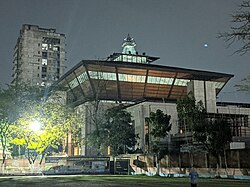This article needs to be updated.(June 2024) |
Assam Legislature | |
|---|---|
| 15th Assam Assembly | |
| Type | |
| Type | |
Term limits | 5 years |
| History | |
| Founded | 7 April 1937 [1] |
| Leadership | |
Gulab Chand Kataria since 15 February 2023 | |
Leader of the house Chief Minister | |
| Structure | |
| Seats | 126 |
 | |
Political groups | Government (82) NDA (82) Official Opposition (27) Other opposition (17) |
| Elections | |
| First past the post | |
Last election | 27 March to 6 April 2021 |
Next election | 2026 |
| Meeting place | |
 | |
| Assam Legislative Assembly complex, Dispur, Guwahati, Assam, India - 781006. | |
| Website | |
| www.assambidhansabha.org | |
The Assam Legislature is the unicameral legislature of the Indian state of Assam. The Legislature is composed of the Assam Legislative Assembly and the state's governor.
It was the unicameral legislature from 1913 to 1935 and then the upper house of the bicameral legislature from 1935 to 1947, when it was disbanded by the India (Provincial Legislatures) Order, 1947, and the Assam Legislative Assembly became unicameral. [6]
On 14 July 2013, Assam Legislative Assembly passed a resolution for the creation of Legislative Council in the state of Assam with 42 members. The Assam Legislative Council Bill, 2013 was introduced in the Rajya Sabha on 3 December 2013. [7]